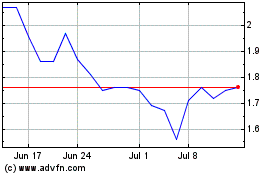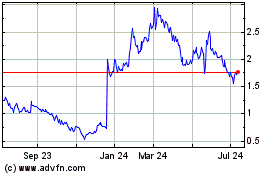Compugen Presents Experimental Results Supporting Induction of Immune Tolerance by CGEN-15001 Drug Candidate
October 16 2013 - 7:00AM
Business Wire
Induction of immune tolerance would be of
great value in prevention and treatment of autoimmune diseases and
conditions
CGEN-15001 presentation at Autoimmune &
Inflammation Leaders’ Forum includes demonstration of in
vivo efficacy in transplant rejection and psoriasis
In a presentation tomorrow at the Autoimmune & Inflammation
Leaders’ Forum in Boston, Massachusetts, Galit Rotman, PhD, Chief
Scientist of Therapeutics at Compugen Ltd. (NASDAQ: CGEN), will
disclose results from an animal model study in which CGEN-15001, an
Fc fusion protein drug candidate derived from a novel immune
checkpoint protein discovered by Compugen, demonstrated potential
to induce immune tolerance, a much desired goal for treatment of
many immunological disorders. The presentation will also disclose
recent positive results from a humanized animal model of psoriasis,
further expanding the scope of autoimmune conditions potentially
treatable by CGEN-15001.
In her presentation, Dr. Rotman will disclose results from a
recently completed bone marrow transplantation study in which
CGEN-15001 was highly effective in preventing graft rejection,
suggesting that this drug candidate acts through an induction of
immune tolerance. Establishment of immune tolerance is a key goal
in the treatment of autoimmune diseases. In comparison to current
therapeutic approaches that generally suppress the immune system,
tolerance induction would provide a sustained resolution of the
disease without compromising the immune system’s capacity to fight
infections and malignancies.
The bone marrow transplantation study was performed as part of
Compugen’s ongoing collaboration with Stephen Miller, Professor of
microbiology-immunology at Northwestern University Feinberg School
of Medicine. In this study, bone marrow cells from male mice were
transplanted into female mice of the same strain, followed by
monitoring of the number of male cells in their blood. In
CGEN-15001 treated animals, successful engraftment of the
transplanted bone marrow cells was observed, while in control
animals the transplanted cells were rejected. These results suggest
that treatment with CGEN-15001 induces immune tolerance towards the
transplanted cells. Additional data will also be presented for
CGEN-15001 supporting this highly desired mechanism of action in
type 1 diabetes and multiple sclerosis animal models.
Dr. Rotman will also disclose results from a recently completed
psoriasis animal study performed in collaboration with Prof. Amos
Gilhar from the Technion Institute in Israel, demonstrating
CGEN-15001’s potential for treatment of this serious chronic
medical condition. CGEN-15001 was tested in a humanized mouse model
of psoriasis, in which a normal human skin patch is grafted onto
immune-deficient mice, and disease is then induced by injection of
blood cells taken from psoriasis patients. CGEN-15001 was injected
into the skin graft starting on the day of disease induction, and
the skin was subsequently analyzed for psoriatic histological
characteristics. Results of this study demonstrated that treatment
with CGEN-15001 was highly efficient in the prevention of
psoriasis. Currently there is no cure for psoriasis, and treatment
may include topical steroids, phototherapy, and systemic agents
that suppress the immune system.
About Immune Tolerance
Immune tolerance is the normal state in which the immune system
is programmed to avoid attacking the body’s own cells and tissues.
When immune tolerance is compromised, the immune system can
mistakenly identify the body’s own cells or tissues as foreign
invaders, leading to various autoimmune diseases, such as diabetes
type 1 or multiple sclerosis. Reprogramming the immune system to
re-establish tolerance, termed tolerance induction, can lead to a
sustained resolution of auto-immunity and prevention of transplant
rejection. Furthermore, tolerance induction, as opposed to current
therapeutic approaches that suppress the immune system, has the
potential to specifically treat the immune condition without
compromising the capacity of the immune system to fight infectious
diseases and malignancies. Therefore, induction and establishment
of immune tolerance is widely recognized as a key goal in the
treatment of autoimmune diseases and prevention of transplant
rejection.
About CGEN-15001
CGEN-15001 is a novel Fc fusion protein drug candidate
consisting of the fusion of an IgG Fc domain to the extracellular
region of CGEN-15001T. CGEN-15001T is a novel immune checkpoint
discovered by Compugen through its predictive discovery
infrastructure and has been shown to have potential as a target for
cancer immunotherapy. CGEN-15001 was shown to be effective in
treating several autoimmune diseases in animal models, including
multiple sclerosis, rheumatoid arthritis and type 1 diabetes.
About Compugen
Compugen is a leading drug discovery company focused on
therapeutic proteins and monoclonal antibodies to address important
unmet needs in the fields of immunology and oncology. The
Company utilizes a broad and continuously growing integrated
infrastructure of proprietary scientific understandings and
predictive platforms, algorithms, machine learning systems and
other computational biology capabilities for the in
silico (by computer) prediction and selection of product
candidates, which are then advanced in its Pipeline Program. The
Company's business model includes collaborations covering the
further development and commercialization of selected product
candidates from its Pipeline Program and various forms of research
and discovery agreements, in both cases providing Compugen with
potential milestone payments and royalties on product sales or
other forms of revenue sharing. In 2012, Compugen established
operations in California for the development of oncology and
immunology monoclonal antibody therapeutic candidates against
Compugen drug targets. For additional information, please visit
Compugen's corporate website at www.cgen.com.
This press release contains “forward-looking statements” within
the meaning of the Private Securities Litigation Reform Act of
1995. These statements, include words such as “may,” “expects,”
“anticipates,” “potential,” “believes,” and “intends,” and describe
opinions about future events. Forward-looking statements in this
press release include, but are not limited to, statements relating
to the potential of CGEN-15001 to prevent transplant rejection and
to treat multiple autoimmune conditions, including, multiple
sclerosis, rheumatoid arthritis, type 1 diabetes and psoriasis.
These forward-looking statements involve known and unknown risks
and uncertainties that may cause the actual results, performance or
achievements of Compugen to be materially different from any future
results, performance or achievements expressed or implied by such
forward-looking statements. Some of these risks and other factors
are discussed in the "Risk Factors" section of Compugen’s Annual
Report on Form 20-F for the year ended December 31, 2012 as filed
with the Securities and Exchange Commission. In addition, any
forward-looking statements represent Compugen’s views only as of
the date of this release and should not be relied upon as
representing its views as of any subsequent date. Compugen does not
assume any obligation to update any forward-looking statements
unless required by law.
Compugen Ltd.Tsipi HaitovskyGlobal Media
Liaison+972-52-598-9892tsipih@netvision.net.il
Compugen (NASDAQ:CGEN)
Historical Stock Chart
From Mar 2024 to Apr 2024

Compugen (NASDAQ:CGEN)
Historical Stock Chart
From Apr 2023 to Apr 2024
